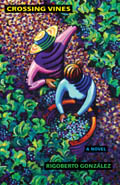|
|
We
are solitary—that's
how we
write and revise. But we certainly don't create on our own since
we are constantly responding to our environment—that which angers
or
inspires us.
The Poet Behind the
Page
The Essay Chapbook
Excerpt from "Glimpse
Between Waking and Sleeping"
“Son, are you awake?”
“…”
“…”
“
What do you want?”
“
Me? Nothing. I just thought if you were awake we could talk.”
“
About what?”
“
Whatever. Your friends. Do you have many friends in Riverside?”
“
A few.”
“
Any special friends?”
“
They’re all special.”
“
And…?”
“
And nothing.”
“
Well, tell me more. Tell me anything. How did you meet them?”
“
Which one?”
“
Any one of them.”
My father and I exchange words in the dark. I can’t even tell what time
it
is, but I know it’s too early in the morning to be having this conversation
on the bus, especially about my special friends. I can just make out sky becoming
clearer over the horizon and the dominant sound is still the rough engine shifting
gears as it speeds onward to Michoacán. And then something takes hold
of me. A need for sex, but not just sex with anyone; I’m hungering for
my lover.
I want to believe that my lover is sitting up on the edge of his bed at this
hour, his face inside his hands, letting the streetlight stripe the interior
of the lonely room through the slits of the Venetian blinds. His body is a
silhouette, but solid, which makes the expression of his grief more beautiful,
like a flower growing out of rock.
more . . . The Essay Chapbook
Rigoberto
González has written two poetry books: So Often
the Pitcher Goes to Water until It Breaks, a National Poetry Series
selection, and Other Fugitives and Other Strangers; two children’s
books: Soledad Sigh-Sighs and Antonio’s Card; the novel Crossing
Vines, winner of ForeWord Magazine’s Fiction Book of the
Year Award; and a memoir, Butterfly Boy. The recipient of a Guggenheim
Fellowship and of various international artist residencies, he
writes a monthly Latino book column, now in its third year, for
the El Paso Times of Texas. He is contributing editor for Poets
and Writers Magazine, and an Associate Professor of English and
Latino Studies at the University of Illinois, Urbana-Champaign.
Visit his website: www.rigobertogonzalez.com.
 "So
Often the Pitcher Goes to Water Until It Breaks by Rigoberto
González is a poetic 'remembrance of things past,' a rare combination
of beauty and craft, employed in the service of memory." — Ai "So
Often the Pitcher Goes to Water Until It Breaks by Rigoberto
González is a poetic 'remembrance of things past,' a rare combination
of beauty and craft, employed in the service of memory." — Ai
"This book is a magnificent debut. Rigoberto González's
poems shock me—they regale with the charming particulars of death and
constant loss, of a world of love, bonds between people, but no safety.
González has a sensitivity to tragedy that sounds as ancient as
it does personal and immediate. His knowledge of the spirituality of
working, of almost mystically odd professions, gives us stories and characters
we've never encountered before. A brilliant poet of two nations, he is
a treasure found." — Sandra McPherson
 “Rigoberto González, paying homage to Tomás Rivera’s
1971 . . . y no se lo tragó la tierra, brings the Chicano novel
back to its source. In a debut that distills a unique poet’s sensibility,
this novel intertwines the sixties and nineties to explore farm workers’ lives
and their experience with la huelga. González courageously tackles
issues such as labor, assimilation, sexuality, and the tension between
the self and the world—a milestone!”—Ilan Stavans,
author of The Hispanic Condition and On Borrowed Words “Rigoberto González, paying homage to Tomás Rivera’s
1971 . . . y no se lo tragó la tierra, brings the Chicano novel
back to its source. In a debut that distills a unique poet’s sensibility,
this novel intertwines the sixties and nineties to explore farm workers’ lives
and their experience with la huelga. González courageously tackles
issues such as labor, assimilation, sexuality, and the tension between
the self and the world—a milestone!”—Ilan Stavans,
author of The Hispanic Condition and On Borrowed Words
“ Crossing Vines is a long day’s journey into night, a skillful and
realistic view into the work and lives of a crew of grape pickers. A
generation ago Tomás Rivera opened our eyes to the lives of migrant
workers. Rigoberto González brilliantly continues his legacy.” —Rudolfo
Anaya, author of Bless Me, Ultima and Zia Summer
Email
Rigoberto González: rigoberto70@aol.com
| |
 "So
Often the Pitcher Goes to Water Until It Breaks by Rigoberto
González is a poetic 'remembrance of things past,' a rare combination
of beauty and craft, employed in the service of memory." — Ai
"So
Often the Pitcher Goes to Water Until It Breaks by Rigoberto
González is a poetic 'remembrance of things past,' a rare combination
of beauty and craft, employed in the service of memory." — Ai  “Rigoberto González, paying homage to Tomás Rivera’s
1971 . . . y no se lo tragó la tierra, brings the Chicano novel
back to its source. In a debut that distills a unique poet’s sensibility,
this novel intertwines the sixties and nineties to explore farm workers’ lives
and their experience with la huelga. González courageously tackles
issues such as labor, assimilation, sexuality, and the tension between
the self and the world—a milestone!”—Ilan Stavans,
author of The Hispanic Condition and On Borrowed Words
“Rigoberto González, paying homage to Tomás Rivera’s
1971 . . . y no se lo tragó la tierra, brings the Chicano novel
back to its source. In a debut that distills a unique poet’s sensibility,
this novel intertwines the sixties and nineties to explore farm workers’ lives
and their experience with la huelga. González courageously tackles
issues such as labor, assimilation, sexuality, and the tension between
the self and the world—a milestone!”—Ilan Stavans,
author of The Hispanic Condition and On Borrowed Words